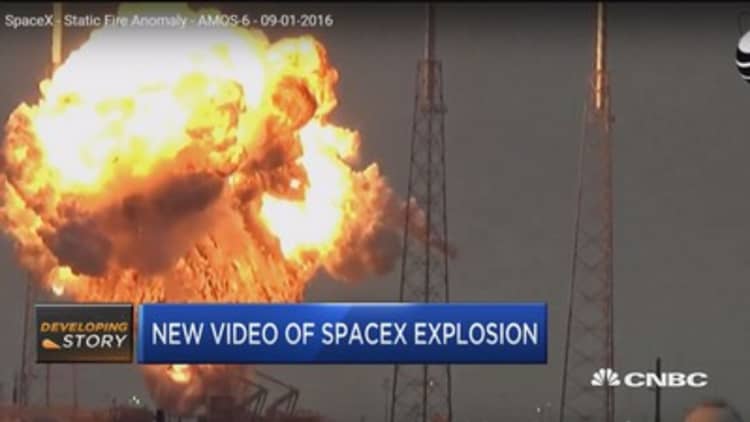
A SpaceX rocket blew up on the launch pad at Cape Canaveral on Thursday, shaking nearby buildings and spewing smoke into the sky, two days before its planned liftoff with an Israeli satellite.
The satellite was intended to expand broadband and video services for the Middle East and parts of Europe and Africa, including a Facebook project to expand internet access in sub-Saharan Africa.
In a tweet, SpaceX CEO Elon Musk said accident happened when propellant was being loaded, but the cause of the explosion was not determined.
In an earlier statement, SpaceX said there were no injuries but the "anomaly" on the launch pad destroyed the Falcon 9 rocket and its payload, the Amos-6.
According to SpaceX's website, its standard payment plan for a Falcon 9 launch is $62 million.
The explosion happened around 9:15 a.m.
"There are no hazards to the general public," Brevard County Emergency Management Director Kimberly Prosser told Florida Today. "We're monitoring the situation, but there have been no requests for assistance."
Saturday's launch was supposed to be SpaceX's ninth this year and 29th since its initial venture in June 2010. The mission was to place a communications satellite belonging to Israel-based Spacecom into orbit over the equator.
Facebook had partnered with French telecommunications firm Eutelsat to use the satellite. Eutelsat said the loss of the satellite could cost the company up to $56 million through 2019.
Israeli newspaper Haaretz said in October 2015 that the satellite cost $300 million to build, and was supposed to operate for 16 years.
Last week, Beijing Xinwei Technology Group agreed to buy Spacecom for $285 million, according to Reuters. However, the deal was contingent on the successful launch and in-orbit testing of the Amos-6 satellite.
The explosion happened while Facebook CEO Mark Zuckerberg was in sub-Saharan Africa.
"As I'm here in Africa, I'm deeply disappointed to hear that SpaceX's launch failure destroyed our satellite that would have provided connectivity to so many entrepreneurs and everyone else across the continent,"Zuckerberg said in a post. "Fortunately, we have developed other technologies like Aquila that will connect people as well. We remain committed to our mission of connecting everyone, and we will keep working until everyone has the opportunities this satellite would have provided."
Local NBC affiliate WESH posted video of the rising smoke.
SpaceX has had other setbacks. In June 2015, an unmanned SpaceX CRS-7 rocket exploded about two minutes after liftoff from the cape during a mission to carry cargo for the International Space Station. Musk blamed it on a structural failure.
SpaceX resumed launches in December 2015, when a Falcon 9 rocket blasted off from Florida with a payload of communications satellites. As planned, its reusable main-stage booster landed safely near its launch pad.
Correction: This story was revised to correct that the launch was supposed to be SpaceX's ninth this year and 29th overall. Also, the launch was scheduled for Saturday. This was unclear on an earlier headline.


